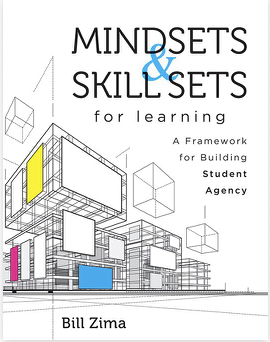Inquiry Inventory - 04/20/22
Here at The Human School, a big part of what brought us together is a deep love of reading and learning. We commit, as part of our learning journey, to sharing our week’s reading with you and what influences our thinking and learning.
Each week, you will see a post with what we’re reading, a quote, and an insight from that reading that leads us to deeper thinking.
To learn more about what we are reading, please take a look at our Connection Catalog.
Mindsets and Skill Sets for Learning: A Framework for Building Student Agency by Bill Zima
“Learning from experience requires us to be reflective. Furthermore, reflection should not only occur after a learning experience is over. It should happen in all three stages of learning: (1) before, as one begins to visualize the end goal; (2) during, as one chooses a pathway to the goal and monitors progress; and finally, (3) after the learning opportunity, as one reflects on how it went.”
The first core mindshift in the Storytelling Compass point is: Reflect on your journey and what you’ve curated: Navigating from ignoring what happened to learning from what happened.
Zima reminds us that reflection has multiple stages: before, during and after.
Since we’re in a year of R&D at The Human School, I love running across ideas that help us clarify our work, The Human School Compass and the accompanying mindshifts.
What is the research behind reflection and how do we iterate The Humans School Compass to include the various stages? This is a question I am asking.
—Randy
“This is Me, Learning about How I Learn” by Gary Chapin
“How you answer the question depends on what you want out of the team experience…
What are you after? What evidence are you seeking? This is a fundamental question that task designers often skip, usually because they think the curriculum or the standards make it obvious. It’s not obvious.”
Reading Chapin’s article, I could feel all of our Compass Points coming to life - Inventor, Curator, Storyteller, and OBJECTOR. The above makes me especially think of how much we assume is true and assume happens for students without truly asking ourselves or better yet, asking them.
When we design a task (or an assignment, depending on your language choice), how often do we sit and consider what we hope the learner gains from it? And then what WE want to see as the teacher, the facilitator, the coach, the supervisor? How might we stop and consider those questions for schooling and education in general? What are we after? What evidence are we seeking from schools? Educators? Classrooms? Content areas? Students? Assignments? What are we after?
—Rachel
Against the Rules (Season 3 Podcast) by Michael Lewis
After exploring what's happened to referees and coaches, the third season of Against the Rules tackles what's happened to our trust in experts and expertise. An expert has probably saved your life more than once. So why is it so hard to judge who the real experts are? And why, once we’ve found them, do we struggle to listen to what experts have to say? In this season, we meet oceanographers and baseball writers, nurses and former gang members — people who don't have a lot in common but the mixed blessing of their expertise.
The third season of this fantastic podcast is focused on experts and expertise. There is a strong connection to our Curator compass point and the mindshift :Leverage your insider perspective: Navigating from devaluing your insider perspective to embracing our collective expertise. The insights I am gleaning from what has been released so far can best be summarized by questions:
How do we find and leverage the unknown experts in our schools and classrooms?
How might we see our learners as the experts (as opposed to teachers, who are in and of themselves experts too)?
How might we build collective expertise with humility and by intentionally learning from what happened (another one of our mindshifts)
—Chad



